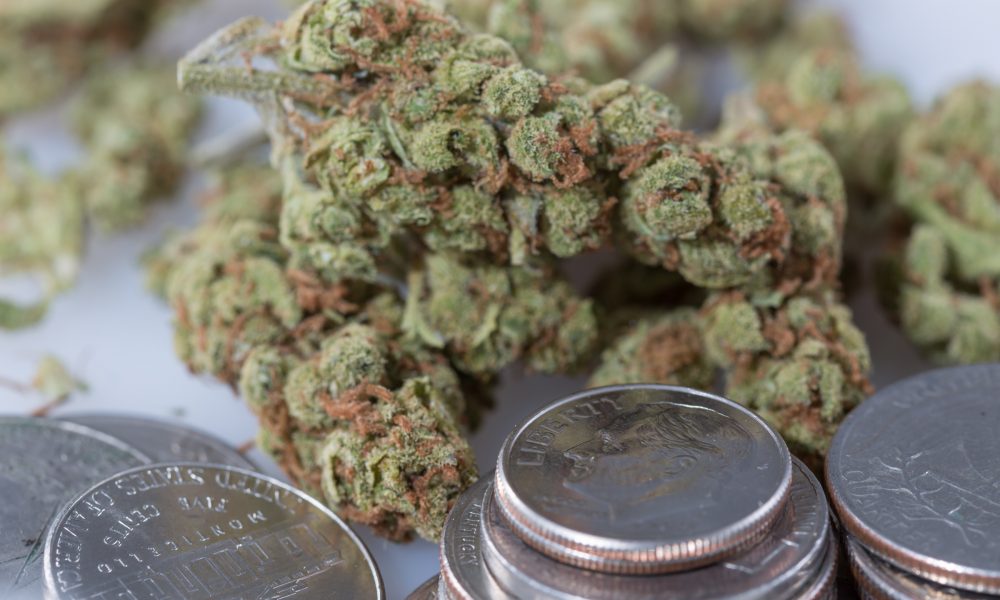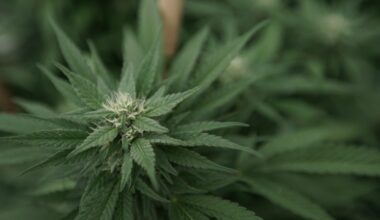As the House prepares to vote on a bill to federally legalize marijuana this week, lawmakers from both major parties have continued to file amendments that will be taken up by the House Rules Committee on Wednesday before the legislation reaches the floor.
Most of the proposed revisions to the Marijuana Opportunity, Reinvestment and Expungement (MORE) Act would impose additional restrictions on the reform measure, including by making legalization contingent on the completion of certain studies, barring federal funding to states that permit certain cannabis products, maintaining penalties and limiting expungement provisions.
One filed amendment, however, would have far-reaching implications by providing relief for people who have been denied a security clearance over marijuana at any point over the past half-century.
The Rules Committee will determine at a meeting scheduled for 1:00 PM ET whether or not to make any of the amendments in order for floor consideration.
When the MORE Act reaches the floor, it will mark the second time in history that cannabis legalization legislation has been taken up by a full chamber of Congress. An earlier version of the bill passed the House in 2020, but stalled in the Senate. Then it passed again this session in the House Judiciary Committee, which is chaired by the bill’s sponsor Rep. Jerrold Nadler (D-NY).
Here’s a rundown of the amendments that have been introduced to the MORE Act so far:
Rep. Dan Bishop (R-NC): Require the transportation secretary and attorney general to develop and publish “best practices for the recognition and testing of drivers impaired by marijuana” before any provision of the legalization bill could take effect, according to the text.
Rep. Conor Lamb (D-PA): Require the National Institute for Occupational Safety and Health to conduct a study on the “impact of the legalization of recreational cannabis by states on the workplace” and develop “best practices for use by employers that are transitioning their policies related to the use of recreational cannabis, prioritizing the development of best practices for employers engaged in federal infrastructure projects, transportation, public safety and national security.”
Rep. Conor Lamb (D-PA): Mandate that the secretary of education conduct a study on “the impact of the legalization of recreational cannabis by states on schools and school-aged children” and develop “best practices for use by educators and administrators to protect school-aged children from any negative impacts of such legalization.”
Rep. Conor Lamb (D-PA): Maintain enhanced federal penalties for distributing more than five grams of marijuana to a person under the age of 21 and for distributing more than five grams of marijuana within 1,000 feet of a school, college, playground or public housing authority, or within 100 feet of a youth center, public swimming pool or arcade.
Rep. Josh Gottheimer (D-NJ): Provide $10 million for the National Highway Traffic Safety Administration to conduct research on “technologies and methods that law enforcement may use to determine whether a driver is impaired by marijuana.”
Rep. Pete Pete Stauber (R-MN): Make it so immigrants could be deported for driving under the influence of marijuana.
Rep. Tiffany Thomas (R-WI): Create a civil penalty for manufacturing or distributing cannabis products with any “constituent, ingredient or artificial or natural flavor additive (other than marijuana), including a fruit, vanilla, coconut, licorice, cocoa, chocolate, candy, confectionaries, menthol or coffee.”
Rep. Tiffany Thomas (R-WI): Require that marijuana products be sold in packaging that is “designed or constructed to be significantly difficult for children under 5 years of age to open or obtain a toxic or harmful amount of the substance contained therein within a reasonable time and not difficult for normal adults to use properly.” It would also mandate that cannabis products be labeled with a warning that states: “The Surgeon General has determined pregnant women should not use marijuana, which affects the developing fetus, and is associated with adverse outcomes for newborns including lower birth weight, poor cognitive function, hyperactivity and other long-term consequences.”
Rep. Bob Lotta (R-OH): Permanently place fentanyl analogues in Schedule I but also streamline the research process for all drugs in that category—including cannabis and psychedelics—by aligning requirements with those for the less-restricted Schedule II.
Rep. Andy Harris (R-MD): Make it so none of the provisions of the legalization bill could be enacted until various federal bodies perform studies on the impact of legalization and the directors of the National Institute on Drug Abuse and National Institutes of Health certify that, based on the resulting data, “the societal, public safety and public health benefits of enacting the bill outweigh the societal, public safety and public health risks.” The studies they would need to take into account are as follows. A review by the comptroller general of the “societal impact of the legalization by States of adult use of cannabis.” A review by the secretary of health and human services on the “public health impact of legalization of adult use of cannabis.” A review under the secretary of transportation, conducted by the National Highway Traffic Safety Administration, of data on “cannabis-impaired driving.” The amendment lays out several specific areas each review would need to examine.
Rep. Chris Pappas (D-NH): Clarify that certain people would not be eligible to have their past cannabis convictions expunged, including those who were also convicted of violent crimes, sex offenses, possessing a weapon or involvement with fentanyl.
Rep. Debbie Lesko (R-AZ): Bar federal funds from being sent to any state in which it is legal to see marijuana or THC “in candy, soda, chocolate, ice cream or other kid-friendly food or beverage.
Rep. Debbie Lesko (R-AZ): Bar federal funds from being sent to any state that has legalization marijuana “unless such state offers education campaigns on marijuana impaired driving.”
Rep. Debbie Lesko (R-AZ): Delay the legalization bill from taking effect until the National Highway Traffic Safety Administration and the secretary of health and human services “can identify what delta-9-tetrahydrocannabinol concentration level is considered to cause impairment and intoxication in adults.”
Rep. Michael Burgess (R-TX): Require the secretary of health and human services to break down data on the prevalence of substance use disorders mandated under separate legislation into specific categories for “marijuana use disorder,” “methamphetamine use disorder,” and any other specific substance use disorders as determined by the secretary.
Rep. Chris Stewart (R-UT): Bar certain federal funds from being sent to any state where it is legal to “sell tetrahydrocannabinol in an alcoholic beverage.”
Rep. Larry Bucshon (R-IN): Delay the legalization bill from taking effect until the attorney general, secretary of health and human services and National Highway Traffic Safety Administration “jointly confirm to Congress that a test for standardized field sobriety testing for marijuana is available for use by law enforcement officers for use in investigations of instances of driving while intoxicated or impaired.”
Rep. Jamie Raskin (D-MD): Require federal agencies to review security clearance denials going back to 1971 and retroactively make it so cannabis could not be used “as a reason to deny or rescind a security clearance.”
Rep. Jerrold Nadler (D-NY): Clarify that protections for immigrants cover “possession or use of cannabis that is no longer prohibited pursuant to this Act or an amendment made by this Act.”
Most of these are Republican-led and would likely be viewed as hostile to the bill’s sponsor and aren’t expected to be made in order.
Of the more notable, reform-friendly amendments, however, is the one filed by Rules Committee member Raskin, to create a retroactive review process for those who were denied security clearances over marijuana going back to 1971.
In January, the director of national intelligence (DNI) said that federal employers shouldn’t outright reject security clearance applicants over past use and should use discretion when it comes to those with cannabis investments in their stock portfolios.
There has already been one change to the text of the MORE Act when it was filed for floor action this week, which some advocates are cheering, as it seemingly would give additional leeway to businesses that would be required to get a federal permit to operate a marijuana business.
While the earlier version said a permit could be rejected if a prospective business’s premises “are not adequate to protect the revenue” generated from legalization, the new language says the rejection can be made if officials determine the premises “will not be adequate.
It seems like a minor revision, but the practical effect could be to make it so small businesses would have more flexibility to obtain a permit as they take steps to build out their operations while applications are pending.
Following the announcement that the House would again be voting on the MORE Act, the majority and minority leaders of the Judiciary Committee then released a nearly 500-page report on what the legislation would accomplish and outlining arguments for and against the reform.
What would the MORE Act do as drafted?
Nadler’s MORE Act would deschedule marijuana by removing it from the list of federally banned drugs under the Controlled Substances Act (CSA). However, it would not require states to legalize cannabis and would maintain a level of regulatory discretion up to states.
Marijuana products would be subject to a federal excise tax, starting at five percent for the first two years after enactment and rising to eight percent by the fifth year of implementation.
Nobody could be denied federal public benefits based solely on the use or possession of marijuana or past juvenile conviction for a cannabis offense. Federal agencies couldn’t use “past or present cannabis or marijuana use as criteria for granting, denying, or rescinding a security clearance.”
People could not be penalized under federal immigration laws for any cannabis related activity or conviction, whether it occurred before or after the enactment of the legalization legislation.
The bill creates a process for expungements of non-violent federal marijuana convictions.
Tax revenue from cannabis sales would be placed in a new “Opportunity Trust Fund.” Half of those tax dollars would support a “Community Reinvestment Grant Program” under the Justice Department, 10 percent would support substance misuse treatment programs, 40 percent would go to the federal Small Business Administration (SBA) to support implementation and a newly created equitable licensing grant program.
The Community Reinvestment Grant Program would “fund eligible non-profit community organizations to provide a variety of services for individuals adversely impacted by the War on Drugs…to include job training, reentry services, legal aid for civil and criminal cases (including for expungement of cannabis convictions), among others.”
The program would further support funding for substance misuse treatment for people from communities disproportionately impacted by drug criminalization. Those funds would be available for programs offering services to people with substance misuse disorders for any drug, not just cannabis.
While the bill wouldn’t force states to adopt legalization, it would create incentives to promote equity. For example, SBA would facilitate a program to providing licensing grants to states and localities that have moved to expunge records for people with prior marijuana convictions or “taken steps to eliminate violations or other penalties for persons still under State or local criminal supervision for a cannabis-related offense or violation for conduct now lawful under State or local law.”
The bill’s proposed Cannabis Restorative Opportunity Program would provide funds “for loans to assist small business concerns that are owned and controlled by individuals adversely impacted by the War on Drugs in eligible States and localities.”
The comptroller general, in consultation with the head of the U.S. Department of Health and Human Services (HHS), would be required to carry out a study on the demographics of people who have faced federal marijuana convictions, “including information about the age, race, ethnicity, sex, and gender identity.”
The departments of treasury, justice and the SBA would need to “issue or amend any rules, standard operating procedures, and other legal or policy guidance necessary to carry out implementation of the MORE Act” within one year of its enactment.
Marijuana producers and importers would also need to obtain a federal permit. And they would be subject to a $1,000 per year federal tax as well for each premise they operate.
The bill would impose certain packaging and labeling requirements.
It also prescribes penalties for unlawful conduct such as illegal, unlicensed production or importation of cannabis products.
The Treasury secretary would be required to carry out a study “on the characteristics of the cannabis industry, with recommendations to improve the regulation of the industry and related taxes.”
The Bureau of Labor Statistics (BLS) would be required to “regularly compile, maintain, and make public data on the demographics” of marijuana business owners and workers.
Workers in “safety sensitive” positions, such as those regulated by the Department of Transportation, could continue to be drug tested for THC and face penalties for unauthorized use. Federal workers would also continue to be subject to existing drug testing policies.
References to “marijuana” or “marihuana” under federal statute would be changed to “cannabis.” It’s unclear if that would also apply to the title of the bill itself.
The move to hold another vote on the cannabis legalization bill comes weeks after congressional Democrats held a closed-to-press session at a party retreat that included a panel that largely centered on the reform legislation.
Meanwhile, advocates and stakeholders are eagerly awaiting the formal introduction of a separate Senate legalization bill that’s being finalized by Majority Leader Chuck Schumer (D-NY) and colleagues. Schumer recently said the plan is to file that bill—the Cannabis Administration & Opportunity Act (CAOA)—in April.
Also in Congress, a separate bill to tax and regulate marijuana is also in play this session. Rep. Nancy Mace (R-SC) is sponsoring that legislation, and she said in a recent interview that she’s received assurances from Democratic leaders that her States Reform Act will receive a hearing following the MORE Act floor vote.
Meanwhile, on the same day that it was announced that the MORE Act would be heading to the floor again, the Senate unanimously approved a bipartisan bill meant to promote research into marijuana, in part by streamlining the application process for researchers who want to study the plant and to encourage the Food and Drug Administration (FDA) to develop cannabis-derived medicines.
Congressional researchers separately released a report recently that details the challenges posed by ongoing federal prohibition and the options that lawmakers have available to address them.
Congressional Memo Touts Marijuana Momentum In 2021 And Lays Out 2022 Reform Priorities
Photo courtesy of Mike Latimer.
Medical Disclaimer:
The information provided in these blog posts is intended for general informational and educational purposes only. It is not a substitute for professional medical advice, diagnosis, or treatment. Always seek the advice of your physician or other qualified healthcare provider with any questions you may have regarding a medical condition. The use of any information provided in these blog posts is solely at your own risk. The authors and the website do not recommend or endorse any specific products, treatments, or procedures mentioned. Reliance on any information in these blog posts is solely at your own discretion.






